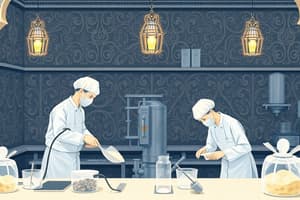Podcast
Questions and Answers
What is the importance of cleaning and sanitizing?
What is the importance of cleaning and sanitizing?
Food can easily be contaminated if you don't keep your facility and equipment clean and sanitized.
What must cleaners be like?
What must cleaners be like?
- Corrosive
- Stable (correct)
- Non-corrosive (correct)
- Unsafe
What must be done to food-contact surfaces after cleaning?
What must be done to food-contact surfaces after cleaning?
They must be sanitized.
For heat sanitizing, water must be at least _____.
For heat sanitizing, water must be at least _____.
What factors influence the effectiveness of chemical sanitizers?
What factors influence the effectiveness of chemical sanitizers?
What surfaces must be cleaned and sanitized?
What surfaces must be cleaned and sanitized?
List the steps to clean and sanitize a surface.
List the steps to clean and sanitize a surface.
When should kitchen items be cleaned and sanitized?
When should kitchen items be cleaned and sanitized?
What instructions do equipment manufacturers provide?
What instructions do equipment manufacturers provide?
How often must clean-in-place equipment be cleaned?
How often must clean-in-place equipment be cleaned?
What temperature must high-temperature dishwashers reach for sanitizing?
What temperature must high-temperature dishwashers reach for sanitizing?
What should you NEVER do when drying items?
What should you NEVER do when drying items?
What is often used to clean and sanitize large items?
What is often used to clean and sanitize large items?
What are the steps to clean and sanitize in a 3-compartment sink?
What are the steps to clean and sanitize in a 3-compartment sink?
Flashcards are hidden until you start studying
Study Notes
Cleaning and Sanitizing
- Importance of keeping facilities and equipment clean to prevent food contamination.
Cleaners
- Cleaners must be stable, non-corrosive, and safe.
- Follow manufacturer’s instructions meticulously.
- Do not interchange cleaners unless specified.
Sanitizers
- Must sanitize food-contact surfaces after cleaning and rinsing.
- Heat sanitizing requires water at least 171℉ for 30 seconds.
- Chemical sanitizing uses solutions of chlorine, iodine, or quats, regulated for safety.
Sanitizer Effectiveness
- Factors affecting effectiveness include:
- Concentration: Measured in parts per million (ppm).
- Temperature: Must meet manufacturer’s recommendations.
- Contact Time: At least 30 seconds for pathogen elimination.
- Water Hardness: Affects sanitizer efficiency based on mineral content.
- pH: Influences sanitizer effectiveness.
When to Clean and Sanitize
- Clean and sanitize surfaces after use, before handling different food types, after interruptions, or every 4 hours of constant use.
Steps to Clean and Sanitize a Surface
- Remove food remnants.
- Wash the surface thoroughly.
- Rinse to remove cleaning agents.
- Apply sanitizer.
- Allow surface to air-dry.
Cleaning Stationary Equipment
- Follow manufacturer instructions for systematic cleaning and sanitizing.
Clean-in-Place Equipment
- Equipment like soft-serve machines require daily cleaning unless specified otherwise by the manufacturer.
Dishwashing
- Use machines for tableware; larger items should be cleaned by hand.
- High-Temperature Machines need a final rinse of at least 180℉.
- Chemical-Sanitizing Machines work at lower temperatures but need to follow guidelines.
Dishwasher Operation
- Maintain cleanliness and ensure proper loading to avoid overcrowding.
- Items should air-dry; never use towels for drying.
- Regularly monitor water conditions for temperature and pressure.
Manual Dishwashing
- Utilize a three-compartment sink for large items.
Cleaning and Sanitizing in a 3-Compartment Sink
- Rinse or soak items before washing.
- Wash items in the first sink, rinse in the second, sanitize in the third.
- Do not rinse after sanitizing; air-dry on a sanitized surface.
Studying That Suits You
Use AI to generate personalized quizzes and flashcards to suit your learning preferences.




